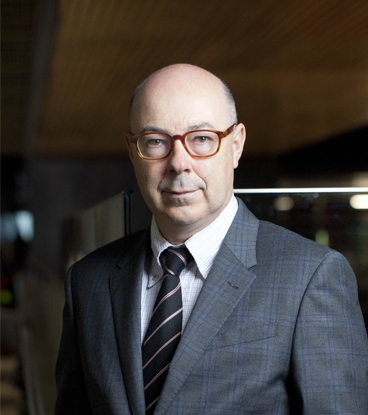10 Nov 2015
The future of sustainable agriculture
Food and water are two of the most basic essentials for human existence. Under pressure, we may well learn to live without the internet again but without food, water and acceptable air to breathe, we cease to exist.
Underpinning discussion of commodity prices, market opportunity, agricultural subsidies, this was the fundamental theme of the latest ANZ “Conversations That Matter" forum investigating the Geopolitics of Food in the New World. For keynote speaker Carlos Gutierrez, former US secretary of Commerce and former chief executive of multi-national food giant Kellogg, the big mystery is just why food safety, production and security of supply are not as prominent at a government level as other critical issues like cybersecurity.
"In complete contrast to the mantras of organic farming, modern greenhouses are now in the vanguard of sustainability."
Louise O Fresco, President of Wageningen University and Research Centre in The Netherlands
“I didn't understand it when I ran Kellogg, I tried to raise the profile of the challenge when I was in the (George W.) Bush administration and I think it's a critical issue today," he told the forum.
The issues are profound and complex: the technical and scientific challenges co-exist with political and competitive tensions. The growing need to boost food production can run up against popular resistance in some – usually advanced – countries to alternatives which could save millions of lives today, such as genetically modified crops and organisms.
And so much food is wasted. One of the most striking insights, from ANZ agribusiness expert Michael Whitehead, Director of Insights and Analytics, was food wastage – through spoilage, excess supply where it is not wanted, poor supply chain – has obvious solutions but lacks either political or commercial imperatives.
Gutierrez believes the looming Trans Pacific Partnership will crystallise some of the debate around these issues but they are profound.
This fascinating essay from Aeon.co frames the debate around the simple tomato.
“The tomato is one of our lovelier foods; juicy icon of the good life," Louise O Fresco writes – clearly for a middle class audience in a developed country: “Few people are indifferent to the sun-drenched cherry tomatoes served up in every picturesque Italian village trattoria; or a well-tended vegetable garden where the branches of each tomato plant are carefully tied by hand with a green ribbon – these fruits are harvested with loving care.
“Most likely you feel such tomatoes should be organically grown, on small fields, reflecting tradition and history. You might think, this way, they accrue authenticity, honesty and truth, their production will be small-scale and preferably local."
But there is the global geopolitical challenge: the planet's population can't be fed like this. In a very real sense, the farmers' market movement is not sustainable, O Fresco argues.
“We cannot go back to the ill-designed agricultural systems of past centuries with their famines and harvest failures. We must harness science and innovation the better to feed the nine billion-plus people – mostly urban – who will be alive in 2050, doubling food and agricultural production in the process."
And the speakers at the ANZ Forum agreed.
Panellist Andrew Hamilton, client partner, Hitachi Consulting, is shepherding a huge project in Changchun in China called the “Changchun Food Safety City".
The project is supported by the United Nations Office for Project Services (UNOPS) and aims to develop a 10 square kilometre model production centre.
According to Hamilton, the project aims to address the increasing concerns and demands for safe agricultural and food products by consumers and to upgrade the efficiency and agricultural production and operations - improving the quality of life for thousands of low-income families around the Changchun area, yield positive impacts to local agricultural and bolster a more sustainable local economy.
In a sense, this is an organic farmer and his or her market on a global scale: “The objective of the project is to successfully develop a showcase and centre of excellence for agricultural industry optimisation and upgrading, based on an integrated environmentally-friendly organic agriculture production process, with an end to end safety monitoring and traceability process for the entire food production value-chain."
If it works, Hamilton says, it can be a model for elsewhere in China and other developing countries.
For Frederik Groth, chief executive Asia for ADM Asia-Pacific Trading, the challenges, if not the answers, are clear: the global population is growing, as countries develop they demand higher quality food and more protein, and the current global system cannot deliver it.
“We have to be realistic," he says.
Louise O Fresco is President of Wageningen University and Research Centre in The Netherlands
The views and opinions expressed in this communication are those of the author and may not necessarily state or reflect those of ANZ.
editor's picks
26 Jun 2015
Food-truck philanthropy
Tracee Hutchison |
10 Mar 2015
